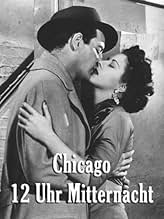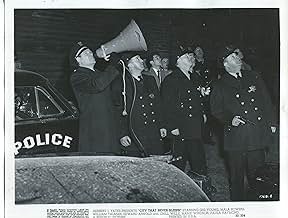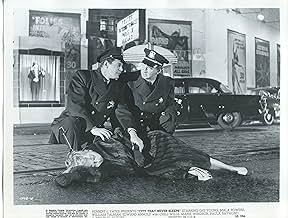IMDb RATING
6.7/10
1.7K
YOUR RATING
Johnny Kelly, who plans on resigning from the police force and leaving his wife the next day, has a very eventful last night on duty.Johnny Kelly, who plans on resigning from the police force and leaving his wife the next day, has a very eventful last night on duty.Johnny Kelly, who plans on resigning from the police force and leaving his wife the next day, has a very eventful last night on duty.
Tom Poston
- Detective
- (as Thomas Poston)
Roy Barcroft
- Mechanical Man Attraction Hawker
- (voice)
- (uncredited)
Helen Gibson
- Woman
- (uncredited)
- Director
- Writer
- All cast & crew
- Production, box office & more at IMDbPro
Storyline
Did you know
- TriviaFirst credited feature film for actor-comedian Tom Poston.
- GoofsStuntman Dale Van Sickel is clearly seen instead of actor William Talman in the shot where Hayes Stewart jumps over the skylight during the rooftop chase.
- Quotes
Sally 'Angel Face' Connors: When I first came to this town I was gonna be - oh, there were a lot of things I was gonna do. Become famous. But Chicago's the big melting pot, and I got melted, but good.
- Crazy creditsThis motion picture is respectfully dedicated to the police and police departments of America - a brave army of men and women who form our first line of defense in preserving our sacred principles of personal liberty and justice. We gratefully acknowledge the valuable assistance given by the City of Chicago and its police and Police Department, whose cooperation made this picture possible.
- ConnectionsReferenced in An Inn at Osaka (1954)
Featured review
Contrary to the croonings of Liza Minnelli and Frank Sinatra, The City That Never Sleeps is not New York, New York but Chicago, Illinois. At least it is in John H. Auer's 1953 movie of that name, sort of a noir-inflected Grand Hotel or Dinner At Eight, that opens and closes with floodlit vistas of the wedding-cake Wrigley Building. Several characters' lives intersect in an urban crime drama that even offers a touch of the fanciful.
Gig Young, at the center, plays a cop who's dissatisfied with his job and with his marriage (his wife, Paula Raymond, makes more money than he does). Off hours, he hangs around a strip club called The Silver Frolics on Wabash Avenue to see, both on stage and backstage, headliner Mala Powers. That relationship is a rocky as his marriage, and she's as unhappy with her lot as he with his (`Whaddaya want me to do? Crawl into a deep freeze?' she taunts him during yet another breakup). Then Young heads to the precinct for the graveyard shift, riding in a prowl car with a new partner he's never met before (Chill Wills, who also plays the unseen `Voice of the City').
During Young's nocturnal tour he meets up again and again with the various players in the plot. There's rich, crooked lawyer Edward Arnold, who blackmails him into burglarizing some incriminating papers; his two-timing wife, Marie Windsor; former magician turned criminal William Talman; his own brother (Ron Hagerthy) who's now Talman's apprentice; his pop (Otto Hulett), a police veteran; and a `mechanical man' (Gregg Warren) who entertains passersby in the Silver Frolics' window.
Some of the ties among the characters are up front, others furtive, to be doled out as the plots thicken. By the end (Poverty Row having learned the lessons MGM taught a couple of decades earlier in the titles cited above), there's tragedy and heartache, reappraisals and reconciliations. There's even a character who vanishes as mysteriously as he materialized a whiff of the supernatural which curiously fails to leave any influence on the way the stories unfold.
The City That Never Sleeps shows the right breadth for a big, urban story from Arnold's moderne penthouse to Young's middle-class flat to the raffish alleys running off Wabash Avenue. Director of photography John Russell (later to film Psycho) helps Auer out with some crafty touches (a telephone dial glowing from a flashlight shone upon it comes to mind). It's not a haunting movie, but it's a satisfying one a title that did Republic Pictures proud.
Gig Young, at the center, plays a cop who's dissatisfied with his job and with his marriage (his wife, Paula Raymond, makes more money than he does). Off hours, he hangs around a strip club called The Silver Frolics on Wabash Avenue to see, both on stage and backstage, headliner Mala Powers. That relationship is a rocky as his marriage, and she's as unhappy with her lot as he with his (`Whaddaya want me to do? Crawl into a deep freeze?' she taunts him during yet another breakup). Then Young heads to the precinct for the graveyard shift, riding in a prowl car with a new partner he's never met before (Chill Wills, who also plays the unseen `Voice of the City').
During Young's nocturnal tour he meets up again and again with the various players in the plot. There's rich, crooked lawyer Edward Arnold, who blackmails him into burglarizing some incriminating papers; his two-timing wife, Marie Windsor; former magician turned criminal William Talman; his own brother (Ron Hagerthy) who's now Talman's apprentice; his pop (Otto Hulett), a police veteran; and a `mechanical man' (Gregg Warren) who entertains passersby in the Silver Frolics' window.
Some of the ties among the characters are up front, others furtive, to be doled out as the plots thicken. By the end (Poverty Row having learned the lessons MGM taught a couple of decades earlier in the titles cited above), there's tragedy and heartache, reappraisals and reconciliations. There's even a character who vanishes as mysteriously as he materialized a whiff of the supernatural which curiously fails to leave any influence on the way the stories unfold.
The City That Never Sleeps shows the right breadth for a big, urban story from Arnold's moderne penthouse to Young's middle-class flat to the raffish alleys running off Wabash Avenue. Director of photography John Russell (later to film Psycho) helps Auer out with some crafty touches (a telephone dial glowing from a flashlight shone upon it comes to mind). It's not a haunting movie, but it's a satisfying one a title that did Republic Pictures proud.
Details
- Release date
- Country of origin
- Language
- Also known as
- Chicago - 12 Uhr Mitternacht
- Filming locations
- Production company
- See more company credits at IMDbPro
- Runtime1 hour 30 minutes
- Color
- Aspect ratio
- 1.37 : 1
Contribute to this page
Suggest an edit or add missing content

Top Gap
By what name was City That Never Sleeps (1953) officially released in India in English?
Answer
































